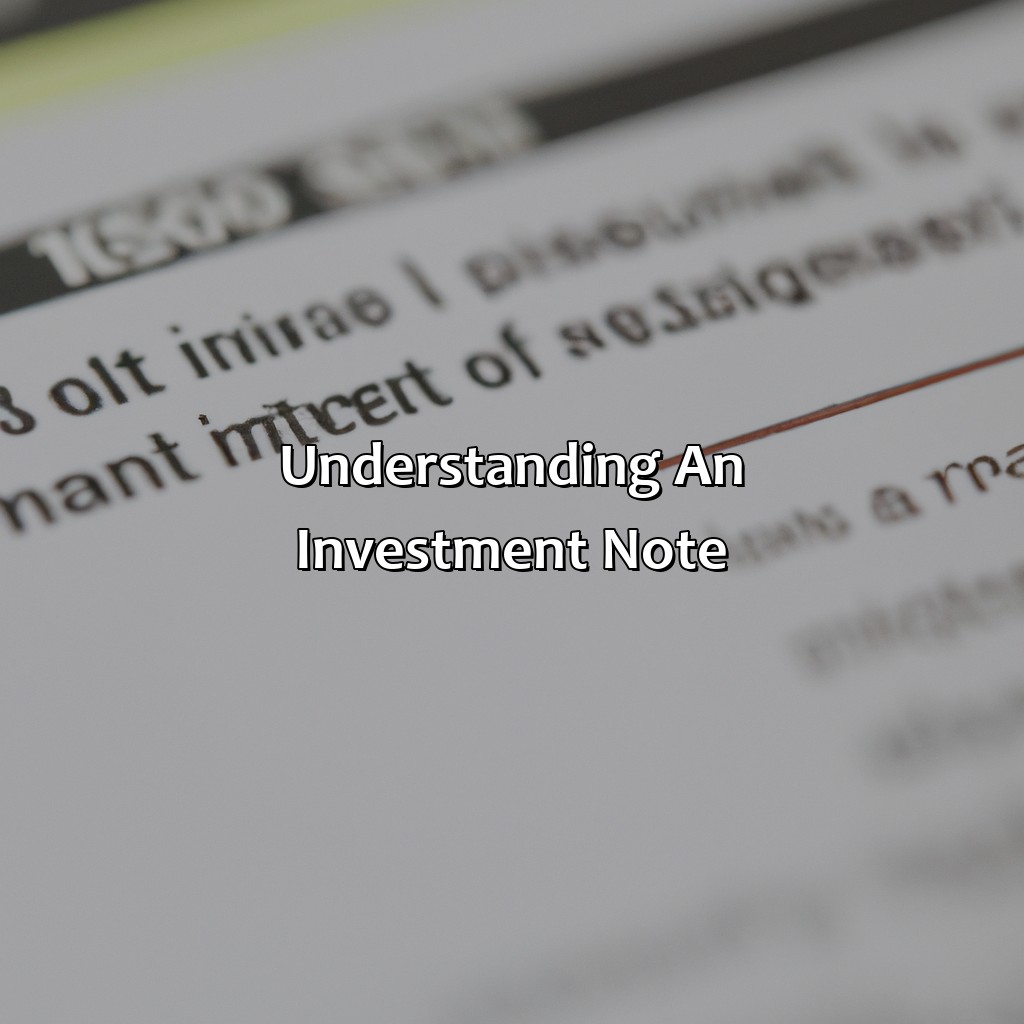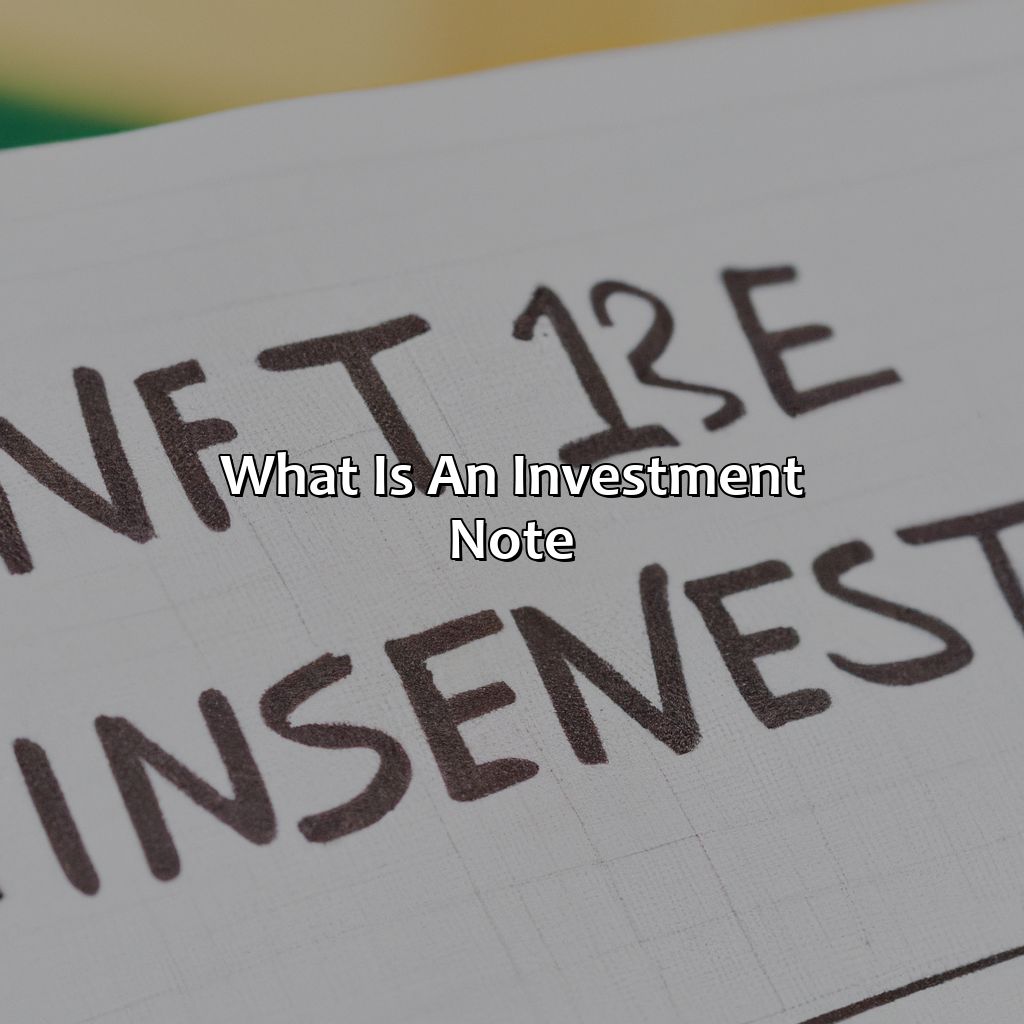What Is An Investment Note?
Key Takeaway:
- Investment notes are a type of debt security issued by a company or organization to raise capital. These notes have a fixed maturity date and pay periodic interest to investors.
- Investment notes can be secured or unsecured, fixed or variable, and registered or unregistered. Investors can choose the type of investment note that best fits their financial goals and risk tolerance.
- While investing in investment notes can provide benefits such as relatively high returns, there are also potential risks involved, such as default risk, interest rate risk, and liquidity risk. It’s important to carefully evaluate the issuer and understand the terms and conditions before investing in investment notes.
Are you wondering what an investment note is? You’re not alone. Many potential investors have questions about this asset class. Learn about the basics of investment notes and how they can help you meet your investing goals.
Understanding an Investment Note
Want to understand investment notes? You must know what they are, and what characteristics they have. Here’s a brief explanation! We’ll cover the ‘Definition of Investment Note’ and the ‘Characteristics of Investment Notes’. Get ready to comprehend it!

Image credits: retiregenz.com by Joel Washington
Definition of Investment Note
An investment note refers to a type of debt security that is issued by financial institutions, such as banks, to raise funds from investors. They are typically short-term, fixed-income securities and are commonly used by institutional investors who want to park their money for a short period while earning higher interest rates than they would get in a savings account.
Investment notes work similarly to other types of debt securities, such as bonds or Treasury bills. The issuer promises to pay the investor back with interest after a set period, usually anywhere from a few days to several months. The interest rate on an investment note is determined by various factors, such as supply and demand in the market and the issuer’s creditworthiness.
One unique feature of investment notes is that they can be tailored to meet specific investor needs. For example, if an investor wants exposure to foreign currencies or commodities, they can invest in an investment note that tracks those assets’ performance.
If you’re looking for a short-term investment opportunity with lower risk than other investments, an investment note may be worth considering. Speak with your financial advisor or research online before making any decisions.
Get ready to take notes because these investment notes have some seriously noteworthy characteristics.
Characteristics of Investment Notes
Investment Notes stand out as a feasible option for those looking to invest and earn returns. Below are some Characteristics of Investment Notes:
- They are not insured by the FDIC or other regulatory body
- They offer variable yields, depending on market performance and risk assessment
- They usually carry shorter terms than traditional bonds or notes, typically between 6 months to 5 years
- Issued by companies who need capital to finance their operations, growth or acquisition strategies
- They can be bought from an issuer directly or via a broker-dealer underwriting them, with minimum investment amounts ranging from $1,000 to $25,000
It’s important to note that investing in Investment Notes carries risks. Potential investors should carefully review the issuing company’s creditworthiness and financial statements before investing.
Did you know that Investment Notes were first introduced in 1995 by the Small Business Job Protection Act? Their popularity soon soared beyond small businesses needing quick financing options. Investors started reaping rewards while companies gained immediate access to funds needed for expansion and acquisitions.
Get ready to take note of these investment notes, because there’s more than one way to earn some serious interest!
Types of Investment Notes
Explore the “Types of Investment Notes” to discover more! It contains subsections like:
- Secured and Unsecured
- Fixed and Variable
- Registered and Unregistered Investment Notes
Let the journey begin!

Image credits: retiregenz.com by Joel Jones
Secured and Unsecured Investment Notes
Investment notes come in various forms, including secured and unsecured options. These investments represent a promissory note held by an investor that is intended to provide a return on investment.
- Secured Investment Notes: These notes are backed by collateral such as property or assets, which provides added security and reduces risk for investors.
- Unsecured Investment Notes: These notes do not have the backing of collateral, leaving the investor with higher risk but potential for higher returns.
- Interest Rates: The interest rate paid to an investor on their investment note can vary based on factors like creditworthiness or market conditions.
- Maturity Date: Investment notes typically have a set maturity date at which point the issuer must repay the principal and any interest due.
It’s important to note that commercial paper, bonds, and other securities can also be referred to as investment notes in some cases.
When investing in investment notes, it’s crucial to perform due diligence on the issuer’s financial health, history of payments, and any collateral securing the note.
A few years ago, a friend invested in unsecured investment notes issued by a startup company promising high returns. Unfortunately, the company experienced financial troubles and couldn’t make payments on the notes. As a result, my friend lost their entire investment. This experience highlights the importance of performing thorough research before investing in any type of investment note.
Investment notes: The only notes I take are the musical ones, but if I had to choose, I’d go with a fixed interest rate.
Fixed and Variable Investment Notes
For better understanding, below is a table that compares the features of fixed and variable investment notes:
| Features | Fixed Investment Notes | Variable Investment Notes |
|---|---|---|
| Interest Rate | Fixed | Fluctuating |
| Risk Level | Low | High |
| Return on Investment | Predictable | Unpredictable |
| Maturity Period | Long-term | Short-term |
| Liquidity | Less liquid | More liquid |
It is important to note that while fixed investment notes provide relatively safe returns, they might not keep up with inflation. And while variable investment notes offer higher returns with greater risk, they are more suitable for investors who can handle market volatility.
One should always thoroughly research and evaluate an investment note’s features and risks before investing.
A friend once invested all her life savings in a high-risk variable investment note without fully researching it. The market crashed, leaving her with substantial losses. It illustrates how vital it is to conduct enough research while investing in such financial instruments.
Choosing between registered and unregistered investment notes is like choosing between wearing a helmet or not while riding a unicycle on a tightrope over a crocodile-infested lake.
Registered and Unregistered Investment Notes
One categorization of Investment Notes is based on their registration status. Registered and Unregistered Investment Notes are two such types, with distinct features and requirements.
- Unregistered Investment Notes are not subjected to the same regulatory compliance, as SEC regulations may not apply to them.
- Registered Investment Notes comply with the Securities Act of 1933 and SEC Regulation D exemption.
- Unregistered Investment Notes often have a higher yield but lack documentation and consumer protection measures than Registered notes.
- Registered Investment Notes are authorized securities instruments, that require documentation and adhere to legal compliance, but provide legally assured protection for investors.
- The Scope Investments online platform ensures investments in its registered notes come from accredited investors only.
Apart from differences in regulation and investor protection, additional care needs to be taken while investing in unregistered investment notes. Investors must go through offering documents if provided, seek counsel from registered brokers and review information including the financials before making any commitments.
Investing in Registered investment notes presents fewer risks while providing legal protections. Considering an investor’s financial goals, asset allocation strategy, diversification plans could aid decision-making processes. Strategic analysis of various returns associated with each type could prove useful when selecting between the two types.
Before investing in an investment note, remember the wise words of Benjamin Franklin: ‘An investment in knowledge pays the best interest… but an investment note pays in potential risks and benefits.’
Potential Risks and Benefits of Investing in Investment Notes
Weighing the pros and cons of investing in notes is essential. Risks and benefits are must-consider factors for any investor. Here, we’ll look at the risks and benefits in two sections.
- Pros of investing in notes:
- High level of liquidity, providing investors with the flexibility to sell their notes whenever they want.
- Relatively high yield when compared to other fixed-income investments such as bonds, CDs, etc.
- Low initial investment requirements, making it accessible for investors.
- Diversification, as notes can be purchased across different credit grades and maturities.
- Cons of investing in notes:
- Default risk which poses a risk to the investment.
- Relatively short-term investment which can lead to reinvestment risk, where investors have to reinvest funds after the notes’ maturity.
- No guaranteed return, as returns are based on the credit quality of the borrower.
- Notes are not insured, as these are not considered securities by the US Securities and Exchange Commission, unlike stocks and bonds which have securities insurance.
Investing in notes carries its own pros and cons. And these must be considered before making any decisions.

Image credits: retiregenz.com by Adam Duncun
Risks
Investment Notes: Pitfalls to be aware of
Investing in investment notes can carry some risk, which investors should be aware of. One potential risk is the lack of regulation and transparency around the issuance and trading of investment notes. There is also a risk that the issuer may default on payments or go bankrupt, leaving investors with little to no return on their investment.
Furthermore, investment notes can be illiquid, meaning that investors may not be able to easily sell or transfer their investments. Additionally, these types of investments often come with high fees and charges that can significantly affect returns.
Investors should carefully evaluate the risks associated with any investment opportunity before committing capital. Some key factors to consider include the creditworthiness of the issuer, diversification strategies, and potential returns.
It is important to note that investing always comes with some level of risk, and investors must assess their own tolerance for risk before making any investment decisions.
According to a report by Forbes[1], there has been an increase in scams involving investment notes in recent years.
Benefits of investing in investment notes: potential profits, bragging rights at cocktail parties, and the chance to feel like Gordon Gekko without the legal repercussions.
[1] “Beware Of These Investment Scams.” Forbes, 27 January 2021. https://www.forbes.com/sites/forbesfinancecouncil/2021/01/27/beware-of-these-investment-scams/?sh=22e997f9257a
Benefits
Investment Notes: Potential Advantages
Investment notes have several potential advantages for investors, such as:
- High Yield: Investment notes often have higher yields than traditional fixed-income securities
- Diversification: Investing in notes can expand an investor’s portfolio and diversify risk exposure.
- Liquidity: Investment notes may offer a shorter term length, providing more flexibility and liquidity compared to other long-term fixed income securities.
- Tax Benefits: Certain types of investment notes may offer tax benefits such as tax-deferral which can potentially save investors money in the long run.
In addition to these benefits, some investment notes may also be backed by collateral that may provide extra security and less volatility in comparison to other investments.
Pro Tip: Always do your research – investigate the creditworthiness of the issuer, assess market conditions and understand any associated risks before investing.
Don’t just throw your money at investment notes like confetti at a wedding, educate yourself first on the ins and outs of investing.
How to Invest in Investment Notes
Investing in notes? You need to assess the issuer, comprehend the terms and be conscious of the risks. This section, ‘How to Invest in Investment Notes’ from the article ‘What is an Investment Note?’ gives deeper insights into each of these topics to help you invest in such notes.

Image credits: retiregenz.com by David Duncun
Evaluating the Issuer
Understanding the Creditworthiness of the Issuer
The creditworthiness of the issuer is a crucial point to consider while evaluating investment notes. When investing in investment notes, it is prudent to analyze the issuer’s financial health, reliability, and reputation in the market. It is essential to take into consideration factors such as their credit rating, outstanding debts, revenue streams, and past performance.
To assess the creditworthiness of an issuer further, investors can look at their historical financial statements. The balance sheet, income statement, and cash flow statement provide insight into the company’s overall financial health and its ability to repay the note’s principal amount.
Investors must also research an issuer’s reputation among creditors and shareholders alike. It helps gain a broader understanding of how they manage their business model and whether they have a positive public perception. By conducting due diligence on issuers before investing in their investment notes, investors can mitigate potential risks while maximizing returns.
One unique factor worth noting is that many online platforms now offer automated tools for investors’ assistance regarding this matter. These tools enable investors to access real-time data from multiple sources simultaneously; this allows for insightful analysis regarding an issuer’s financial history and future prospects.
According to Forbes.com, “Between 2017 and 2018 worldwide volumes of issuance went up by 10%, reaching over $1tn for both years.”
Reading the terms and conditions is like trying to decipher the hidden messages in a fortune cookie – tedious and often disappointing.
Understanding the Terms and Conditions
Investment Notes come with numerous terms and conditions, so it’s crucial to understand the fine print before investing. Read and analyze the documents in detail, including any restrictions or penalties, interest rates, repayment periods, and the likelihood of default.
It’s also essential to grasp all legal and financial implications related to investment notes. Ensure that you are familiar with the securities laws and regulations governing these investments. Some Investment Notes may require additional paperwork to be filed in accordance with Securities laws.
If you’re new to investing in Investment Notes or other options, seek professional advice from a financial advisor or a lawyer knowledgeable about securities law before buying Investment Notes.
Lastly, an investor should never rush into buying Investment Notes without understanding fully the terms of the notes. Patience is key when investing.
True Story: An investor purchased Note A without going over its terms and conditions, failing to realize that one condition prevented her from spending any money on personal expenses for 12 months after purchasing Note A. The investor was surprised that she wasn’t able to spend any money on herself.
Don’t invest in investment notes unless you’re willing to risk more than just your money- like your sanity.
Risks Involved
Investment Note Risk Factors
The process of investing in investment notes involves various risk factors which should be analyzed before making any investments. These risks include credit, interest rate, liquidity, market and operational risks.
Credit risk refers to the possibility of a borrower defaulting on their loan. Interest rate risk is the possibility that interest rates may rise or fall leading to a change in the value of the investment note. Liquidity risk relates to the possibility that the investor may face difficulties selling their investment note quickly or at a reasonable price. Market risk refers to fluctuations in market prices affecting the value of the investment note, while operational risk relates to risks associated with administrative errors or fraud.
Investors should analyze all these risks before investing in investment notes to make informed decisions.
Pro Tip: Always have an exit plan when investing in investment notes to mitigate potential losses due to risk factors.
Five Facts About Investment Notes:
- ✅ Investment notes are debt securities issued by companies or governments to raise capital. (Source: Investopedia)
- ✅ Investment notes typically have a fixed interest rate and maturity date. (Source: The Balance)
- ✅ Investment notes can be bought and sold on secondary markets, providing liquidity to investors. (Source: Securities and Exchange Commission)
- ✅ Investment notes are generally considered to have a higher risk and potentially higher return than traditional bonds. (Source: Forbes)
- ✅ Investment notes can be purchased individually or as part of a diversified investment portfolio. (Source: NerdWallet)
FAQs about What Is An Investment Note?
What is an investment note?
An investment note is a type of debt security that is usually offered by a financial institution or a corporation to investors. It is an unsecured promise to repay a specific amount of money plus interest to the holder of the note within a certain period, typically ranging from a few months to several years.
How does an investment note work?
An investor purchases an investment note for a specific amount of money and receives periodic interest payments until the maturity date when the issuer repays the principal amount. The note can be sold in the secondary market before the maturity date, but the price depends on market conditions and the creditworthiness of the issuer.
What are the benefits of investing in investment notes?
Investment notes can offer higher yields compared to traditional savings accounts and other low-risk investments. They also provide diversification and flexibility in investment portfolios, as they can have varying maturities, interest rates, and credit ratings.
What are the risks associated with investment notes?
Investment notes are not backed by the FDIC, meaning there is a risk of losing the principal amount invested if the issuer defaults. They are also subject to interest rate risk, credit risk, and liquidity risk. Therefore, it is important for investors to carefully evaluate the creditworthiness of the issuer and understand the terms of the note before investing.
What factors affect the interest rate of investment notes?
The interest rate of investment notes depends on various factors such as the credit rating of the issuer, the length of the maturity, and the prevailing market interest rates. Higher credit ratings usually result in lower interest rates, while longer maturities and higher market interest rates can lead to higher interest rates for the investor.
Can investment notes be tax-free?
Investment notes issued by state or local governments, also known as municipal notes, can provide tax-free interest income for investors who reside in the same state as the issuer. However, it is important to consult with a tax advisor to understand the specific tax implications of investing in investment notes.
